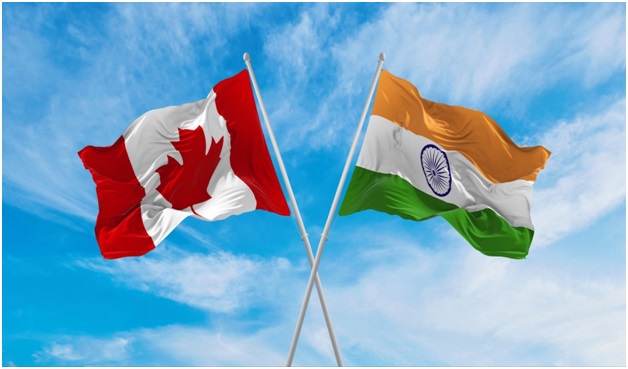Canada-India Standoff and Vienna Convention (Indian Express)

- 25 Oct 2023
Why is it in the News?
- Relationships between India and Canada, which were already tense, have gotten worse as a result of Canada's most recent accusation that India has unilaterally revoked the diplomatic immunity of Canadian diplomats based in India.
- According to Canada, India has violated both the Vienna Convention on Diplomatic Relations (VCDR) and international law.
Context:
- The recent diplomatic dispute between India and Canada arose due to controversial comments by Canadian Prime Minister Justin Trudeau linking Indian agents to the killing of a Khalistani separatist leader.
- In response, India demanded that Canada withdraw 41 of its diplomats to ensure parity in diplomatic representation.
- India cited provisions of the Vienna Convention on Diplomatic Relations to justify its demand.
- The convention allows the receiving state to limit the size of a diplomatic mission to a reasonable number.
- Canada complied with India's demand, withdrawing the 41 diplomats, but expressed concerns about potential violations of the Vienna Convention.
- This ongoing dispute between India and Canada has brought attention to the Vienna Convention and its rules governing diplomatic relations between states.
What is the Vienna Convention on Diplomatic Relations?
- The Vienna Convention on Diplomatic Relations (1961) is a United Nations treaty that set some common principles and terms on how countries must treat each other’s diplomatic representatives, in order to ensure friendly relations and maintain proper communication channels between countries.
- It was approved on April 14, 1961, at the Neue Hofburg in Vienna, Austria, during the United Nations Conference on Diplomatic Intercourse and Immunities.
- 193 nations have ratified the convention as of right now.
- India ratified it through the Diplomatic Relations (Vienna Convention) Act of 1972.
Major Provisions of the Vienna Convention:
- Diplomatic immunity is one of the Convention's guiding principles.
- It guarantees that ambassadors can carry out their responsibilities without intimidation, fear, or threat.
- Diplomats are exempt from arrest and detention under Article 29 of the Convention.
- The host nation is obliged to treat the diplomatic agent with due respect and to take all reasonable precautions to shield the diplomat's person, liberty, or dignity from any harm or violation.
Does India Have the Right to Ask Any Country to Reduce the Size of its Mission?
- Yes, India has every right to make unilateral decisions and it’s actions are entirely compliant with the parity clause.
- According to the Ministry of External Affairs, India's action is consistent with Article 11(1) of the Vienna Convention on Diplomatic Relations (VCDR).
- According to Article 11.1 of the Convention, the host nation may set reasonable and suitable restrictions on the size of a foreign diplomatic mission, taking into account the specific needs of the mission as well as the conditions and circumstances that currently exist in the host country.
- The receiving State may, at any time and without cause, declare the head of the mission or any member of the diplomatic staff persona non grata, or unwelcome, in accordance with Article 9 of the Convention.
- According to MEA, India feels that a reciprocal diplomatic presence in both nations is necessary due to the significantly greater number of Canadian diplomats in India and their ongoing meddling in (India's) internal affairs.
- People with diplomatic privileges and immunities are required by Article 41(1) of the VCDR to refrain from meddling in the domestic affairs of the receiving state.
- Therefore, it would be a violation of Canada's VCDR if these Canadian diplomats were meddling in internal matters in India.
- Additionally, this may be cause to revoke or limit diplomatic immunity.
- In Line with India’s Diplomatic Relations Act of 1972,
- India passed this law in accordance with the Diplomatic Relations Act of 1972 to give the VCDR effect.
- According to Section 4 of this Act, if a nation violates the VCDR, the central government may limit diplomatic privileges and immunities granted to that nation.
International Precedents and Legal Grounds for India's Actions:
- UK's Restriction on the Soviet Mission: The United Kingdom imposed restrictions on the Soviet Union's mission in the UK due to the discovery of Russian diplomats involved in unacceptable activities.
- The UK invoked Article 11 of the VCDR to substantiate its decision.
- US Measures against the Iranian Mission (1979): In 1979, the United States exercised its authority to limit the number of Iranian diplomats stationed in Washington.
- Estonia and Moldova's Approach to the Russian Mission: Earlier this year, Moldova and Estonia both requested Russia to reduce the size of its mission, emphasizing the principle of parity.
- In justifying their actions, both Moldova and Estonia relied on Article 11 of the VCDR.
- Moldova alleged the involvement of Russian diplomats in destabilizing Moldova's internal situation, while Estonia argued that Russian diplomats were actively undermining its security.
Conclusion
Beyond the legal aspects, a larger issue is the current lack of trust between Ottawa and New Delhi. Both sides should focus on adopting confidence-building measures to address this issue.
Allegations of breaching international law could further strain the situation and hinder diplomatic relations.
